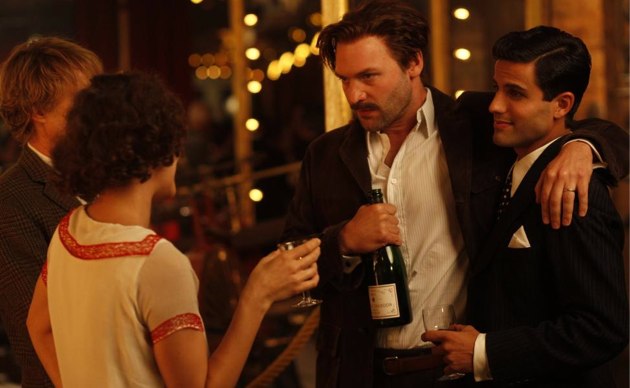Corey Stoll on Midnight in Paris, Being Ernest Hemingway and the Audition of a Lifetime
Going back to Midnight in Paris, what really blew me away was how transporting it is. But to really be transported means that you can't know what happens going into it. Even knowing Ernest Hemingway is in this film seems a spoiler too far.
I guess so. But wasn't there a study that just came out that said something like we actually enjoy stories more when you know the ending?
Maybe! But isn't there a part of you that feels deprived? You got to be in the film, you played this great part, but you never got to experience Midnight in Paris in the way that has captivated this audience of millions.
I don't know. I've gotten so much more attention for this -- even with all the spoiler alerts -- than for anything else I've ever done. I mean, I don't know what else it would be. I think most journalists most haven't really cared. Every review has pretty much given the story away. But it's not The Crying Game. It's not The Sixth Sense. I know that also because it's a movie that a lot of people are watching over and over again, so there's something about it that's more than just the surprise. I'm sure the surprise is great the first time, but... I mean, my parents have seen it six times.
Six times?
They're very proud!
That's... I did see it twice.
Did it hold up?
Yes! But just because it is so successfully transporting.
Exactly! It's Paris! And I think that's what's so brilliant about that opening. People like to compare it to Manhattan -- the opening montage -- but actually, I think he's doing a very different thing. In Manhattan, it's this sort of opening salvo in this artistic expression. It's about, "Here's the story I'm about to tell, and welcome to my world." In this, it's more of a buffer: "I know you just parked and walked through the mall and got your ticket , and here you are." So it's just a few minutes of no language -- none of the sort of modern American realities. You're going to take that time, and it becomes something of an airlock. It's great.
Can you recall your first meeting with Woody Allen?
Mm-hmm. Very much so. I didn't have any material; they didn't say to prepare anything or give me any sides. It was just a meeting. I showed up. He was very complimentary about a play that he saw me in, and then he said, "We'd like you to read something." His assistants weren't prepared for that; I don't think he'd told anybody what was going to happen. So there was this flurry of activity where they got the sides and they handed them to me. It was that monologue where we're in the car on the way to Gertrude Stein's house. It was like a two-page sentence with no punctuation. It was a lot to prepare in five or 10 minutes. But then I came in and did it, and he seemed really happy. He gave me one little adjustment, and I did it again. And that was it. It was a great audition -- the best audition of my life in terms of the sense of not having to feel like I was auditioning, even. It was just this sense of, "Here, just read this. What does this sound like? Is this going to work?" I was shockingly un-nervous for what the stakes were, because you look at it and think, "Wow. There are so many actors who would kill for this role." And it's so well-written, and it's such a juicy character, and you know that Woody Allen is going to direct it perfectly. It was just up to me to not screw it up. [Laughs]
No pressure!
It was just so much fun. The fun and the excitement and the thrill of all these things coming together sort of overtook any sense of nervousness.
How close to the audition was the characterization we saw onscreen?
Probably by the time it got to screen, it was simpler. That's one of the tragedies of an audition is that you feel a need to show the director every color of the rainbow that you're capable of giving as a performer in ever given moment. So you act a lot. The fact that I was able to read so much Hemingway and be in Paris, and that Woody's direction was always to do less and less and less, made it so that what's onscreen is a minimalist version of what one wants to do when one is give this kind of meaty role. But I think the myth of Hemingway and the sound of Hemingway's writing is all about being pared down. It's all about simplicity -- and simplicity to the point of self-parody. Using the same words: "It was good, it was fine" -- sort of these hypnotic run-on sentences that are brilliant language. But when you just take away that little bit of art, it's ridiculous.
So what's next for you?
I just finished shooting The Bourne Legacy, so that was fun.
Who do you play in that?
I'm one of the... scientists from a... secret government organization...
Oh, I get it: No spoilers.
Yeah. I think that's about all I'm allowed to say. But it's a great character who's a lot of fun, and I got to work with Ed Norton in all my scenes. So that was cool. But yeah. That's all I've got.
[Top photo: WireImage]
Pages: 1 2


Comments
Swooooooon. He's so handsome. I hope to see him in more stuff very soon.
I'd love to see Stoll score a Supporting Actor nomination this year.
Just as good with hair as without.
Sooooo yummy! He rocked in Law and Order: Los Angeles.
Agree x3
Oh! Agree x4 now.